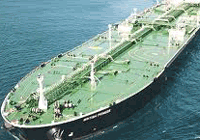
Iran oil curbs 'may revive tanker rates'
Dubai, March 5, 2012
A rush to replace Iranian crude with oil from other suppliers due to sanctions against Iran could breathe some life back into the very large crude carrier (VLCC) market this year, the head of a Dubai-based tanker owner said.
"If you look from a pure supply and demand dynamics it looks like it will be a very difficult year for ship owners," Atle Sebjornsen, the chief executive of leading listed tanker operator Gulf Navigation Holding, told Reuters.
"But, because of the tonne mile impact, any macroeconomic and political events can create unexpected spikes in the market, for example Iran," he said in an interview.
Tonne miles, a way of measuring aggregate traffic by multiplying voyage distance by weight carried, is used to gauge total demand for tankers in the global market.
US and European sanctions aimed at stopping what the West suspects is a covert nuclear weapons programme are hampering Tehran's ability to sell the oil that generates most of its foreign exchange.
Sanctions are set to tighten over the next few months. But some of Iran's biggest buyers - like China and India - have already set off on a global supply search which could revive a VLCC market that has been plagued by tanker oversupply and plunging freight rates.
"Where's the oil lost from Iran going to come from? Some of it will come from here - Saudi Arabia, Kuwait and the UAE - but you also have to take some from West Africa, the Caribbean and North Sea," Sebjornsen said.
"That has a big impact on the tonne mile," he said. Millions of barrels of crude have been shipped on VLCCs from Europe to Asia over the last few months as lower freight rates, weaker European demand and a narrower spread between Brent and Dubai crude prices has made the long voyage profitable.
A reduction of Iranian supply to world markets could make shipping North Sea crude to Asia more attractive still, Sebjornsen said, helping revive tanker rates.
"The prices here (in the Gulf) will come up and then, relatively, the prices of North Sea would be more attractive.
Now that's a big driver for VLCC tonne miles," he said.
Despite potential for a slight recovery in shipping charges in 2012, the uncertain global economic outlook is still a concern for VLCC owners.
World stocks fell on Monday after fresh economic data raised expectations of a recession in Europe and China signalled it would accept slower growth.
"We all need the Chinese economy to keep growing," he said. Many ships ordered when the global economic outlook was good have continued to slide into the water over the last few months, outpacing demand for commodities that they carry and battering ship owners' earnings.
Gulf Navigation expects to take delivery of two new VLCCs in 2013, which will have 10-year charter contracts with China's Hainan Group, doubling the company's VLCC fleet size.
While clouds linger over the VLCC market, the chemical tanker business is looking up, thanks to limited new vessels entering a market where demand is strong.
"Chemical space is one of those segments looking most promising," he said. Gulf Navigation owns eight chemical tankers. -Reuters







